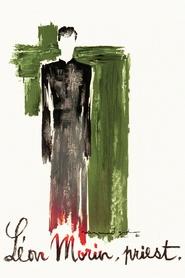Melville avoids the implication that people who make unfortunate choices in wartime are intrinsically bad, or that support for the right cause automatically reflects essential goodness, confounding expectations by depicting a sympathetic German soldier and collaborationist, while picturing a GI who arrives with the liberating Allies as a boorish potential rapist. […] Melville shows us an extreme distortion of feelings produced by Barny’s loneliness and Morin’s immutable vow of chastity. Implicitly, the church and the war both impose a drastic curtailment of existential freedom; Melville is depicting a world where natural impulse and the choice it presents are preempted by contingency, transpersonal exchange weighted and warped by external circumstance.
— Gary Indiana (Criterion)
We perhaps anticipate Leon Morin, Priest will lead to sex. Melville is too good a filmmaker to settle for such a simple solution. To our astonishment, it leads to instruction in the Catholic faith.

